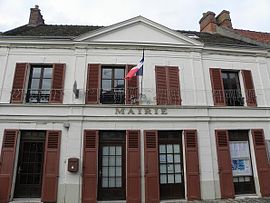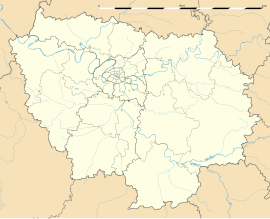Saint-Sulpice-de-Favières
 From Wikipedia the free encyclopedia
From Wikipedia the free encyclopedia
Saint-Sulpice-de-Favières | |
|---|---|
 The town hall in Saint-Sulpice-de-Favières | |
| Coordinates: 48°32′28″N 2°10′41″E / 48.541°N 2.1781°E | |
| Country | France |
| Region | Île-de-France |
| Department | Essonne |
| Arrondissement | Étampes |
| Canton | Dourdan |
| Intercommunality | Entre Juine et Renarde |
| Government | |
| • Mayor (2020–2026) | Olivier Petrilli[1] |
| Area 1 | 4.37 km2 (1.69 sq mi) |
| Population (2021)[2] | 270 |
| • Density | 62/km2 (160/sq mi) |
| Time zone | UTC+01:00 (CET) |
| • Summer (DST) | UTC+02:00 (CEST) |
| INSEE/Postal code | 91578 /91910 |
| Elevation | 62–159 m (203–522 ft) |
| 1 French Land Register data, which excludes lakes, ponds, glaciers > 1 km2 (0.386 sq mi or 247 acres) and river estuaries. | |
Saint-Sulpice-de-Favières (French pronunciation: [sɛ̃ sylpis də favjɛʁ] ) is a commune in the Essonne department in Île-de-France in northern France, located in the metropolitan area of Paris.
Inhabitants of Saint-Sulpice-de-Favières are known as Saint-Sulpiciens.
Geography
[edit]Saint-Sulpice-de-Favières is located in the Renarde valley, 35 km (22 mi) South of Paris.
History
[edit]The previous name of the village is Favières from the Old French faveriis which itself is derived from the Latin fava (broad bean) meaning broad bean field.
Monuments
[edit]Saint-Sulpice church
[edit]The church was built during the 13th century and 14th century and is dedicated to Sulpice the Pious (ca 576–647), bishop of Bourges.
Segrez manor-house
[edit]The manor-house was built during the 18th century and hosted in 1884 one of the biggest arboretums of its time, the Arboretum de Segrez, with more than 6500 species of tree.
See also
[edit]References
[edit]- ^ "Répertoire national des élus: les maires". data.gouv.fr, Plateforme ouverte des données publiques françaises (in French). 2 December 2020.
- ^ "Populations légales 2021" (in French). The National Institute of Statistics and Economic Studies. 28 December 2023.
External links
[edit]- Official website (in French)
- Website of the Domaine de Segrez
- Base Mérimée: Search for heritage in the commune, Ministère français de la Culture. (in French)
- Mayors of Essonne Association (in French)


